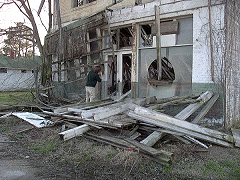








| |

On tour of sites in the Mississippi Delta
|
Rachel Warnick:
I'm in Cleveland, MS, in the Delta, which is an area that developed alongside the Mississippi River
as a plantation-sharecropping economy in the early 20th Century. This morning we went to a black Baptist Church.
The people were all very welcoming of our
group and the preaching and singing was unlike anything I've
experienced before. The choir was just beautiful. And the organ-player,
who wasn't using any music, was so uplifting, even for me as a Jew. I can
really understand how spirituality and spiritual music played such an
important role in the Movement. Spiritual sustainment like that must have been
so important in sustaining strength in the face of violence and fear My
favorite parts, I think, were when the choir was singing and one would come down
in front as a soloist. I think that passion itself is so extraordinary,
and so extraordinarily beautiful, and these men and women were so
passionate about God and Jesus and it was just so beautiful. And then, for
one of the last songs they did, a little old women, very small and
totally unassuming, with thinning hair, got up to sing above the choir, and
wow could that lady sing. And then the preacher too, just a complete
passion for his Lord that I can't even describe.
| 
Luther Brown
|
Sam Butler:
My impression of the south in general was that it was like another country,
but this also is a mentality had in Mississippi. In the state that never
prohibited the making of whiskey, they see themselves as totally
independent and have an innate abhorrence to federal government. There
seems to be a culture of just letting things lie and an avoidance of
creating laws that seem to be common sense. There seems to be a mentality
of just letting people figure things out for themselves. That confederate
independence still thrives in the south. This is the state that has the no
man's lands between AK and MS, where the fingers of the river have left
huge islands, never claimed by either state. This is the area that has
state owned levees on top of land owned by the farmer. It seems like a
paradox, but the system for the most part seems to work itself out just
fine.
| 
Charles McLaurin
|
Rachel Warnick:
After that we went back to eat, and then we took a tour of the Delta. We saw the path where they took Emmett Till, and the old store where he had made his
comment. Luther, the man from Delta State who was leading the tour, made an
interesting comment about the Bryants, who had owned the store: The white
community rallied behind them when they accused Emmett Till, but afterward were driven out of town and had become complete
"white trash." It was a fascinating commentary on the race and class
relations in the deep South of that time. Then we had dinner on Dockery Farms, a huge plantation
in the Delta. There we talked to Charles McLaurin, who was really
interesting also, but I unfortunately did not have my notebook to take
notes. And then we were on the bus on the way back to the hotel and
someone put in "Happy Day" on the sound system and it was entirely
dark on the bus and we were all singing along and it was so surreal and so
out of a movie. Our group as a whole really comes together most
especially in song, I guess. Maybe that song was the theme of today.
|
|



















